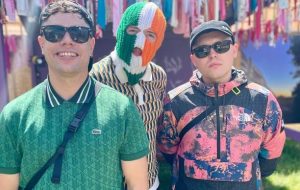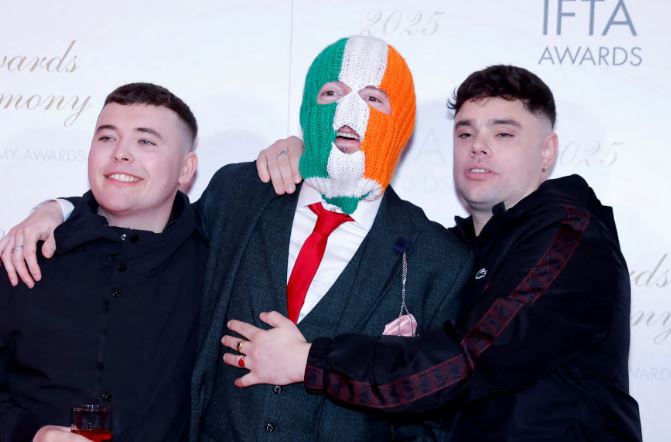As a nation that prides itself on free expression and progressive values, the United Kingdom now finds itself navigating the stormy waters between artistic liberty and national security. The recent charge against Liam Ó hAnnaidh, a member of the Irish rap trio Kneecap, has ignited passionate debates throughout the UK.
For many, it’s a shocking collision of music, politics, and law that raises uncomfortable questions. Can a musician be prosecuted for lyrics and artistic symbolism? Or is this a necessary step in safeguarding public order?
The Kneecap case isn’t just about one artist, it’s about a wider issue: how the state responds to voices that challenge the system. As the controversy unfolds, this article delves deep into who Kneecap is, what happened, and why this case is being closely watched across the UK and beyond.
Who Are Kneecap?

Image – Source
Kneecap is an Irish-language rap group formed in Belfast, Northern Ireland, consisting of Mo Chara, Móglaí Bap, and Liam Ó hAnnaidh.
The trio has gained notoriety for their politically charged lyrics, rebellious performances, and unapologetic attitude.
Their music blends satire, cultural commentary, and the Irish language to critique issues ranging from British colonialism to police misconduct.
The Roots of the Group
Kneecap emerged in the late 2010s and quickly attracted a cult following among Irish youth. Their blend of Gaeilge (Irish) and English in lyrics is more than stylistic, it’s symbolic. It reflects a deep connection to Irish identity, culture, and historical resistance.
Controversial Themes in Their Music
- Pro-republican messages
- Anti-police sentiments
- Strong anti-establishment tone
- References to historical Irish conflicts
Such themes have made them heroes to some and provocateurs to others. Their detractors claim they glorify violence and promote political division, while their supporters argue that they give voice to suppressed histories and marginalised communities.
What Led to the Recent Arrest of Kneecap Member Liam Ó hAnnaidh?
Liam Ó hAnnaidh, the group’s DJ, was arrested in May 2025 following his return from an overseas performance. He was detained at Gatwick Airport and later charged under terrorism-related legislation. The arrest was conducted by the UK’s Counter Terrorism Policing unit, raising alarm bells across artistic and legal communities.
The Timeline of Events
- May 2025: Liam returns from a gig abroad
- Detained by authorities under suspicion of promoting terror through symbolic acts
- The arrest was formally confirmed after hours of interrogation
Authorities allege that certain props and themes used during the performance incited or supported terrorism. These props reportedly included militaristic imagery and political references, though no physical harm was caused.
The nature of this arrest has raised eyebrows, especially given the artistic context. This was not a clandestine event but a public show attended by hundreds.
What Is the Nature of the Criminal Charge Filed?

Image – Source
The exact charge involves the dissemination of material considered to promote terrorist ideology. It falls under the Terrorism Act 2006, which criminalises publications or speech that can be interpreted as encouragement to commit acts of terrorism.
UK Terror Legislation at Play
- Counter-Terrorism and Security Act 2015
- Terrorism Act 2000 and 2006
According to officials, Liam’s actions during a performance crossed legal boundaries. These laws are designed to intercept radicalisation and prevent extremist influence, but in this case, their application is highly debated.
Criticism and Legal Concerns
Legal professionals and human rights activists argue that the case tests the limits of free speech in the UK. Some feel this could set a dangerous precedent for prosecuting artists whose work challenges the establishment.
What Has Been Kneecap’s Response to the Allegations?
Kneecap has been vocal in rejecting the charges, labelling the arrest as an act of political policing and an attempt to silence their movement. They claim that the state is using terrorism laws to criminalise art and dissent.
Public Statements and Social Media Outcry
The group has taken to social media to express their frustration. In a joint statement, they called the charges “a carnival of distraction” and claimed the government is fearful of cultural resistance.
Support from the Music Community
Other musicians, activists, and public figures have rallied in support of Kneecap. Several petitions and online campaigns are urging the UK government to drop the charges and uphold freedom of artistic expression.
What Do Legal Experts Say About the Charges?
Legal experts have mixed views. Some believe the charge is a legitimate application of terrorism laws, while others argue it’s a misuse of power intended to intimidate political artists.
Expert Opinions
- Some barristers warn of a slippery slope where artistic symbols are equated with incitement
- Human rights lawyers argue the laws need reform to prevent abuse against free expression
- Legal commentators note that UK courts will face a dilemma in balancing public safety and creative liberty
This case is already being compared to past incidents involving artists who faced censorship or criminal investigation for political expression.
What Role Does Political Expression Play in Kneecap’s Music?

Image – Source
Political expression is central to Kneecap’s identity. They don’t just entertain—they provoke. Their music addresses colonial history, police brutality, and cultural erasure, making them prominent voices of dissent in Ireland and the UK.
Cultural Relevance of Their Lyrics
- Songs criticise the British government’s role in Northern Ireland
- Performances often include provocative symbols such as balaclavas
- Their branding intentionally blurs the lines between art and activism
Activism Through Art
For Kneecap, rapping in Irish isn’t just creative, it’s political. They revive a language and history often marginalised by mainstream culture, making their music inherently resistant to authority.
What Are the Public and Media Reactions in the UK?
The public is divided. Some see the arrest as a justified response to dangerous rhetoric, while others believe it’s an overreach that criminalises culture.
Social Media Reactions
- #FreeKneecap has trended on X (formerly Twitter)
- Numerous artists and influencers have spoken out
- Fans have staged peaceful protests in Belfast and London
Media Analysis
Publications with progressive leanings have generally supported Kneecap’s freedom to perform, while conservative voices have questioned the appropriateness of their messages.
What Could This Case Mean for Artists and Free Speech in the UK?
This case could become a benchmark for how far the UK government is willing to go in regulating politically charged art. It also raises questions about whether existing laws are equipped to handle such nuanced cases.
Broader Implications
- Other politically active artists may face increased scrutiny
- Legal ambiguity could discourage critical artistic voices
- Advocates are calling for a clearer distinction between expression and incitement
Art and Censorship
The concern isn’t just about one artist, it’s about protecting the space where cultural critique can flourish without fear of retribution.
What’s Next in the Kneecap Member Charged Legal Battle?

Image – Source
Liam Ó hAnnaidh is set to appear in court in the coming months. Legal teams are preparing a defence centred on artistic freedom, arguing that the performance did not promote violence but instead challenged dominant narratives.
Upcoming Legal Milestones
- Preliminary hearings scheduled in June 2025
- Media expected to have limited access due to legal sensitivities
- International human rights groups expected to observe the trial
Regardless of the outcome, the case will have lasting effects on how the UK treats politically outspoken artists, especially those representing minority languages and marginalised histories.
Conclusion
The charge against Kneecap’s Liam Ó hAnnaidh has opened a national and international dialogue on the intersection of music, politics, and law.
In a world where art continues to serve as both resistance and representation, this case underscores the delicate balance between security and expression. Whether this is a necessary enforcement of public order or an overstep into censorship remains to be seen.
One thing is clear: the outcome of this case will resonate far beyond one courtroom. It may well define the space for political art in the UK for years to come.
Frequently Asked Questions
Why was Liam Ó hAnnaidh arrested in 2025?
He was arrested under terrorism-related legislation after performing at a concert where authorities claimed the content promoted extremist ideology.
What is Kneecap known for?
Kneecap is known for their politically charged Irish-language rap music that challenges British authority and promotes Irish cultural identity.
Are the charges against Liam Ó hAnnaidh related to a specific incident?
Yes, the charges are linked to a recent overseas performance where symbolic props and political themes allegedly violated UK terror laws.
How has the public responded to the arrest?
The public is divided, with some supporting the arrest as necessary and others viewing it as an attack on artistic freedom and expression.
Have other groups or individuals supported Kneecap?
Yes, numerous musicians, activists, and cultural organisations have publicly supported the group and criticised the legal action taken.
Featured Image – Source









